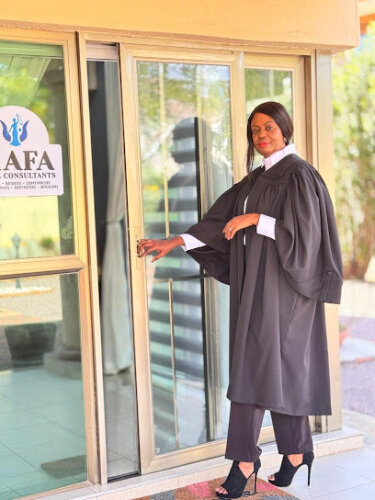Best Estate Planning Lawyers in Gaborone
Share your needs with us, get contacted by law firms.
Free. Takes 2 min.
List of the best lawyers in Gaborone, Botswana
About Estate Planning Law in Gaborone, Botswana
Estate planning in Gaborone, Botswana, involves the legal process of organizing the management and disposal of a person's estate during their life and after death. It ensures that your assets are distributed according to your wishes, thereby minimizing disputes among heirs. This includes creating wills, setting up trusts, and making arrangements for the care of minor children. Estate Planning also seeks to reduce taxes and other expenses that might erode the estate's value.
Why You May Need a Lawyer
There are several scenarios where you might require legal help with estate planning:
- Creating a Will: To ensure your assets are distributed according to your wishes.
- Setting Up Trusts: For specific purposes, such as education or healthcare for beneficiaries.
- Incapacity Planning: To manage your affairs if you become unable to do so yourself.
- Dispute Resolution: To handle any disputes that may arise among beneficiaries or with creditors.
- Asset Protection: To protect your assets from creditors or lawsuits.
- Tax Planning: To minimize the tax burden on your estate and beneficiaries.
Local Laws Overview
Key aspects of local laws relevant to estate planning in Gaborone include:
- Wills Act: Governs the creation and execution of wills, including the requirements for a valid will.
- Administration of Estates Act: Outlines the process for administering an estate after death, including appointing executors and administrators.
- Married Persons Property Act: Affects how property is distributed if you are married, including community of property and antenuptial contracts.
- Trust Property Control Act: Regulates the creation and management of trusts, including the duties and responsibilities of trustees.
Frequently Asked Questions
What is a will, and why is it important?
A will is a legal document that specifies how your assets should be distributed after your death. It is crucial because it ensures your wishes are followed and helps prevent disputes among your heirs.
What happens if I die without a will?
If you die without a will, your estate will be distributed according to the laws of intestacy in Botswana. This may not align with your wishes and could result in lengthy legal processes.
How do I create a legally valid will in Gaborone?
Your will must be in writing, signed by you or someone you direct, and witnessed by two competent witnesses who are present at the same time. Consulting a lawyer can ensure all legal requirements are met.
What is a trust, and do I need one?
A trust is a legal entity that holds assets on behalf of beneficiaries. You might need one for specific purposes like protecting assets from creditors, minimizing taxes, or ensuring a steady income for beneficiaries.
Can I change or revoke my will?
Yes, you can change or revoke your will at any time by creating a new will or a codicil, provided you are of sound mind. It is advisable to consult a lawyer to ensure the changes are legally valid.
What is an executor, and how do I choose one?
An executor is a person or institution appointed in your will to administer your estate. Choose someone trustworthy, organized, and familiar with your affairs. Professional executors like banks or legal firms are also an option.
Is estate planning only for the wealthy?
No, estate planning is beneficial for everyone regardless of the size of your estate. It ensures your assets are distributed according to your wishes and provides clarity and peace of mind for your loved ones.
How can I reduce the tax burden on my estate?
Strategies to reduce tax burdens include setting up trusts, making charitable donations, and gifting assets during your lifetime. A lawyer can provide personalized advice based on your situation.
What happens during the probate process?
During probate, the will is validated, debts and taxes are paid, and the remaining assets are distributed to the beneficiaries. This process is overseen by the High Court and can be complex, especially without legal assistance.
How can I prevent disputes among my heirs?
Clear, detailed estate planning documents can help prevent disputes. Discussing your plans with your beneficiaries and including clear instructions in your will can also minimize misunderstandings.
Additional Resources
Here are some resources and organizations that can be helpful:
- Ministry of Finance and Development Planning: Offers guidance on tax-related aspects of estate planning.
- Law Society of Botswana: Provides a list of licensed legal practitioners specializing in estate planning.
- Botswana Unified Revenue Service (BURS): Offers resources on tax obligations and exemptions related to estates.
Next Steps
If you need legal assistance with estate planning, consider consulting a lawyer specializing in this field. Here are some steps to help you get started:
- Identify Your Needs: Determine what aspects of estate planning you need help with, such as creating a will, setting up a trust, or tax planning.
- Research Lawyers: Look for lawyers who specialize in estate planning in Gaborone. The Law Society of Botswana can be a valuable resource for finding qualified practitioners.
- Schedule Consultations: Meet with a few lawyers to discuss your needs, ask questions, and determine who you feel comfortable working with.
- Prepare Your Documents: Gather relevant documents and information about your assets, liabilities, and beneficiaries to make your consultation more productive.
- Follow Legal Advice: Once you have chosen a lawyer, follow their advice and complete the necessary legal documents to ensure your estate planning is thorough and legally sound.
Lawzana helps you find the best lawyers and law firms in Gaborone through a curated and pre-screened list of qualified legal professionals. Our platform offers rankings and detailed profiles of attorneys and law firms, allowing you to compare based on practice areas, including Estate Planning, experience, and client feedback.
Each profile includes a description of the firm's areas of practice, client reviews, team members and partners, year of establishment, spoken languages, office locations, contact information, social media presence, and any published articles or resources. Most firms on our platform speak English and are experienced in both local and international legal matters.
Get a quote from top-rated law firms in Gaborone, Botswana — quickly, securely, and without unnecessary hassle.
Disclaimer:
The information provided on this page is for general informational purposes only and does not constitute legal advice. While we strive to ensure the accuracy and relevance of the content, legal information may change over time, and interpretations of the law can vary. You should always consult with a qualified legal professional for advice specific to your situation.
We disclaim all liability for actions taken or not taken based on the content of this page. If you believe any information is incorrect or outdated, please contact us, and we will review and update it where appropriate.












